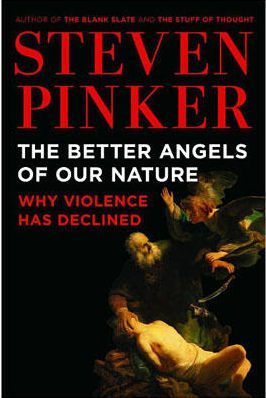Steven Pinker – The Better Angels of Our Nature
All Steven Pinker Is Saying Is –
Give Peace a Chance:
The Cal Tech Lecture for the Skeptics’ Society
October 23, 2011
 Steven Pinker has documented what John Lennon could only imagine: a world in which war is not nearly as popular as it used to be. The Harvard Psychologist and author of the new book The Better Angels of Our Nature: Why Violence Has Declined (Viking Press, NYC, 2011), came to Cal Tech’s Beckman Auditorium to offer a profoundly contrary view to contemporary beliefs that we live in a more violent and dangerous world than ever before, one in which terrorists hold more cards than enlightened rationalists, one in which violence is ever-present and Thomas Hobbes’ assessment of life in nature has become the hallmark of our post 9/11 century: it is mean, nasty, brutish and short.
Steven Pinker has documented what John Lennon could only imagine: a world in which war is not nearly as popular as it used to be. The Harvard Psychologist and author of the new book The Better Angels of Our Nature: Why Violence Has Declined (Viking Press, NYC, 2011), came to Cal Tech’s Beckman Auditorium to offer a profoundly contrary view to contemporary beliefs that we live in a more violent and dangerous world than ever before, one in which terrorists hold more cards than enlightened rationalists, one in which violence is ever-present and Thomas Hobbes’ assessment of life in nature has become the hallmark of our post 9/11 century: it is mean, nasty, brutish and short.
In fact, argues Pinker, nothing could be further from the truth. Surveying 5,000 years of recorded history, and pre-history that has become interpretable due to archaeological science, he concludes that we live in a world marked by a measurable decline of violence of every kind: war—both between nations and civil war–genocide, murder, rape, child abuse, spousal abuse, capital punishment, torture and even corporal punishment of children. At the same time that they have declined, they have also become near universally condemned.
“The folk singers’ dream of the 1960s,” he sums up at one point, “has all but been realized,” citing the antiwar songs of Bob Dylan, the Beatles, Phil Ochs, Malvina Reynolds, Arlo Guthrie (whose Alice’s Restaurant is quoted at length) and Country Joe McDonald, not to mention a quirky novel that celebrated its 50th anniversary this year—Catch-22—war is slowly but persistently heading toward the dustbin of history.
Who knew? I wondered to myself as I watched his amazing graphs in a power point lecture that ranged from evidence gathered from 5,000 year-old buried human skeletons with embedded arrowheads, crushed skulls and ropes encircling their necks, all indicating the path of destruction they had encountered on their way to an early grave, to official historical records charting the gradual social and cultural evolution towards more peaceful times.
In a fifty-minute lecture during which he barely paused to catch his breath, Pinker passionately and elegantly summarized an epic 800-page book that makes a case which overturns received wisdom and restores one’s confidence in human progress.
Nor does he duck—indeed he begins—with the tough questions that would immediately cross any skeptic’s mind: But what about the Holocaust, what about the Armenian genocide, Rwanda, Darfur, the killing fields of Cambodia, World War I and II, Korea, Vietnam, Iraq and Afghanistan, Pakistan, South African Apartheid, American Slavery, lynching in the south, child armies in the Sudan and, here at home, September 11?
What Steven Pinker does so brilliantly is to put them each in context, showing when and where they occurred, and the historic trends that led up to them and flowed from them.
Take slavery, for example: at one time taken as the norm for human civilization, it is now universally condemned and nowhere legal, since 1960 when the last country to endorse it, Mauritania, abolished it. It is a relic of a bygone era.
Or take the death penalty, for example: two hundred years ago there were more than 100 separate crimes in a beacon of Western Civilization, England, punishable by death—including one which Dr. Samuel Johnson particularly deplored: an eight year-old girl who was hanged for stealing a petticoat. As Dylan once wrote (with grim irony), “Things like that don’t happen nowadays.”
Now all European countries have abolished it entirely, and in the holdout United States, one of only five countries in the world to still tolerate it, the only crime for which it is acceptable punishment is murder. It too is clearly becoming a relic of a bygone era.
And take lynching, for example: Pinker cites Abel Meeropol’s song Strange Fruit as a milestone in the sorry history of America’s second greatest shame—in 1930 he was inspired by a photograph of a lynching of two black men in Indiana to write a poem in protest, which he then set to music for jazz singer Billie Holiday. In 1999 Time Magazine called it “The Song of the Century.” In his book, Pinker cites the murder of Emmett Till in Mississippi on August 28, 1955 as “the last lynching in America.” On this point I am not so sure: I think that the murders of African-American James Byrd, Jr. in Jasper, Texas on June 7, 1998 and the 21-year-old gay man Matthew Shepard in Laramie, Wyoming on October 12, 1998, qualify. But Pinker’s larger point is nonetheless well taken: they are both now seen as shocking throwbacks and aberrations, rather than continuities.
More problematic is what Malvina Reynolds charted in A Short History of Warfare:
Back in the Middle Ages/
The nobles fought the wars/
The worst thing that they suffered from was falling off a horse/
They all wore heavy armour with lances and with shield/
And the lovely ladies watched them at the decorated field.
But when the wars got dirty/
With cannon balls and stuff/
With slagging thro the rice paddies and really playing rough/
With ak ak and machine guns, grenades and all like that/
The nobles gave the fighting to the proletariat.
Of armour there was little/
Of chain mail there was none/
The dog-face met the bullets with his open flesh and bone/
The big shots stay and run the wars/
Get richer all the time, And the one who gets the glory/
Posthumously but surely/
Is the soldier of the line.
According to Pinker, if one looks at absolute numbers, yes, more ordinary people died in 20th century wars than in any previous century; but if one measures instead the percentage of the total population killed in warfare, something startling emerges: a very steep decline from previous centuries of mass destruction—from roughly 15% of the population to less than 3%. And if one then moves from the most notorious spikes in death during WWI and WWII to what is going on today (when we have in place the largest “Department of Homeland Security” apparatus in history) the numbers are even more staggering—only 0.3%—a decline of 90%. This underscores what Pinker refers to as The Long Peace, in which during the Cold War era and beyond there have been no shooting wars between any of the Great Powers.
Malvina Reynolds—whose 1962 protest song about nuclear testing What Have They Done To the Rain is quoted in Pinker’s book—may have anticipated this possibility, as the following year JFK negotiated the October 7, 1963 Test Ban Treaty the month before he was assassinated. Who’s to say Malvina’s song did not lay the groundwork, in asking the right question at the right time? And though she never lived to see what Dr. Pinker calls The New Peace, in which the Great Powers are coordinating their efforts to combat what amounts to tribal warfare—another relic from ages past, she let Dr. Pinker rest assured she would still keep on singing:
If peace time came, and we all got poor/
And I had to go begging from door to door/
I wouldn’t sell my old guitar/
Cause I’d sing/
Oh.
If peace time came, and we all got poor/
We’d be richer than we ever were/
And we’d dance in a ring with a ring jing jing/
And we’d sing/
Oh.
Steven Pinker is not simply following Johnny Mercer’s advice to Accentuate the Positive, though he is a self-admitted optimist, he has gone to spectacular, painstaking lengths to support his central hypothesis—that what Abraham Lincoln called the “better angels of our nature” (from the First Inaugural Address) in the title have successfully managed to curtail what Pinker vividly refers to as our “inner demons.” There are many reviews of his book available on-line to spell those out in greater detail than I have time for here; my interest is in calling to your attention the vivid place this Harvard psychologist has given cultural history in general, and folk music in particular, in making his argument. For those used to seeing the names of great protest singers in restricted contexts of music history, how refreshing and inspiring it is to see they have informed an author and book that Skeptic Society founder Michael Shermer introduced by saying it well deserves this year’s Pulitzer Prize.
If Abraham Lincoln represents those better angels, another even older Abraham lies in wait to suggest just what they are struggling against. Those inner demons are symbolized in the gripping cover photograph that puts Pinker’s tale of human progress in the widest possible cultural context: a beautiful reproduction of Rembrandt’s painting The Angel Stopping Abraham From Sacrificing Isaac to God, based on the Old Testament story of Abraham and Isaac. This story has been retold by poets and songwriters as well, by none more movingly than the great soldier/poet of the First World War, Wilfred Owen (cited by Pinker), and in our own time by both Bob Dylan (from Highway 61) and Pinker’s Canadian countryman Leonard Cohen (in Abraham and Isaac).
This remains the core story of our tragic willingness to sacrifice the young for the misguided ambitions of the old: As another of Dr. Pinker’s sources, Phil Ochs, wrote so eloquently during the Vietnam War,
It’s always the old to lead us to the war
Always the young to fall
Look at all we’ve won with a saber and a gun
Tell me was it worth it all?
(I Ain’t Marching Anymore.)
If Dr. Pinker is right, then perhaps we are finally beginning to learn the lessons of this cautionary tale.
And let us therefore hope that Dr. Pinker’s book gets the widest possible audience, so that its hopeful conclusions may continue to ring true for the next generation as well.
Ross Altman may be reached at greygoosemusic@aol.com . Ross will be singing on Dr. Martin Luther King, Jr.’s birthday (observed) in Santa Monica for the 26th annual MLK Day commemoration on Monday morning, January 16, 2012, 9am. at the SGI-USA Auditorium, 525 Wilshire Blvd. (free). It is an interfaith ceremony and all are invited.













